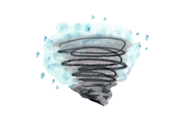Once thought to be a rare event, millions of people experience trauma every year.
In fact, according to the National Council for Mental Wellbeing, 70% of U.S. adults have experienced trauma at least once in their lives.
That’s more than 223 million people America alone.
Discussions about trauma have also increased in recent years—with my private practice mental health clients, as well as in the news, on social media, and among my friends.
Americans’ Google searches for information on trauma have increased significantly since 2015.
Though largely flat in the years between 2004-2014 (with one noticeable spike during the housing and financial crisis of 2008-2009), Americans’ online searches for information about trauma have been increasing significantly since 2015, according to Google Trends data.

With more and more Americans expressing interest in finding out more about trauma, this led me to wonder whether trauma and its symptoms are commonly understood.
If you’re curious about trauma, I’m hopeful we can shed some light on the subject.
Perhaps it might be helpful to mention some of the lesser known signs of trauma as well.
What is trauma?
Simply put, trauma can be caused by experiencing or witnessing an event that threatens a person physically or emotionally.
These events can include childhood abuse and neglect, physical assault, sexual assault, and living during a war or a global health pandemic such as COVID-19.
Yes, there is something called "COVID trauma" and "pandemic PTSD" that mass amounts of Americans have experienced.
Trauma symptoms can result from a sudden extraordinarily stressful one-time experience or a cumulative series of ongoing stressful experiences over a period of time.
Trauma can be caused by experiencing or witnessing an event that threatens a person physically or emotionally.
In Transforming the Living Legacy of Trauma: A Workbook for Survivors and Therapists, Dr. Janina Fisher, Ph.D., suggests trauma is remembered through sensory elements, such as emotions and sensations in the body, as well as heart rate increases and changes in breathing.
These traumatic memories are stored in the amygdala, aka the brain's fire alarm.
When the amygdala is triggered during a traumatic event, the part of the brain that houses verbal memory is shut down.
This results in survivors storing the trauma in their bodies—emotionally and somatically.
How is trauma different from PTSD?
If trauma goes unresolved, it can result in a more serious condition known as post-traumatic stress disorder (PTSD).
Symptoms of post-traumatic stress disorder include severe anxiety, flashbacks, nightmares, and avoidant behaviors.
Eventually, PTSD can interfere with a person's relationships and ability to function effectively in their day-to-day lives.

Trauma symptoms
Most people are familiar with the primary symptoms of trauma portrayed on TV shows and in movies—such as flashbacks, nightmares, fear, anxiety, and anger.
However, there are several lesser-known symptoms of trauma that you may not have realized are trauma-related.
Hidden signs of trauma
1. Few or no memories
When I meet with a client who reports that they have few or no memories of their childhood, I am typically concerned there may have been some trauma.
Although this is not always the case, memory loss may be the result of a client dissociating during a traumatic event.
Dissociation is a common defense mechanism that occurs when a person “mentally escapes” from a traumatic experience.
According to the International Society for the Study of Trauma and Dissociation’s Fact Sheet III, dissociation is a common defense mechanism that occurs when a person “mentally escapes” from a traumatic experience.
As a result, they may not remember the trauma or any events that occurred during that period of their life.
Findings from a 2014 study conducted on rats suggest that—even among individuals without memories of an early childhood trauma—signs of PTSD may still develop during adulthood.
While the study was conducted on rats, the results suggest human adults may experience “changes in symptoms and neuropathology associated with PTSD, even if there is no explicit memory of the early trauma.”

2. Chronic pain
Experiencing chronic stress as the result of trauma does impact our physical health.
When threatened, the body experiences a fight, flight, or freeze survival response.
If these responses remain activated over long periods—particularly when the trauma occurred during childhood—the impact can persist into adulthood, causing chronic pain.
A 2020 study assessing the connection between childhood trauma and long-term pain found that various types of childhood trauma are possible factors contributing to anxiety and pain-related conditions in adulthood.
3. Difficulty with relationships
Much of my work as a therapist revolves around dysfunctional relationships my clients are trying to resolve.
Experiencing trauma can cause a person to gravitate toward unhealthy relationships and stay in them too long.
When working with a client who reports a history of relationship issues, I become curious whether they may have experienced trauma.
Experiencing trauma can cause a person to gravitate toward unhealthy relationships and stay in them too long.
People who experienced trauma in their childhoods may feel insecure and unlovable.
As a result, it may feel comfortable or familiar for them to spend time with people who abuse, gaslight, neglect, and emotionally manipulate.

4. Skin problems
When we experience trauma, the body’s main stress hormone—cortisol—is activated.
Cortisol boosts our energy so we can handle stressful events better, and then it also helps to restore balance after the stressor.
With trauma, the body stays in a consistent stressed state, and levels of cortisol become unstable.
This stress response can reduce the water in the outer layers of skin, reducing the skin’s ability to repair and regenerate.
With trauma, the body stays in a consistent stressed state, and levels of cortisol become unstable.
This can lead to very dry skin, psoriasis, rosacea, and other skin problems, according to a 2017 article published in Clinics in Dermatology titled “Post-traumatic stress disorder (PTSD) and the dermatology patient."
5. Eating disorders
You may already be aware that substance abuse can result from trauma, however it’s also important to acknowledge that eating disorders—such as anorexia and bulimia—can be symptoms of trauma as well.
A study conducted in 2020 found that participants who had reported trauma exposure in both childhood and adulthood had significantly more purging behaviors than those with no trauma.
Eating disorders are about control. A trauma survivor may feel out of control or powerless after a traumatic event and use controlling food as a way to manage feelings.
How to heal trauma?
So, what can we do to resolve, address, and heal trauma?
The most important thing is to work on developing healthy coping skills.
Practice mindfulness and yoga
Yoga, meditation, and progressive muscle relaxation are all helpful ways of dealing with symptoms of trauma.
These techniques are particularly effective on the overstimulating nervous system of someone with trauma.
Research has shown practicing mindfulness and mindfulness-based therapy (MBT) is an excellent and effective way to deal with overwhelming emotions and thoughts that frequently appear for people who have experienced trauma.
According to a 2020 systematic review and meta-analysis on Mindfulness and yoga for psychological trauma, mindfulness and yoga are “interventions increasingly used for trauma-related psychiatric conditions.”

Keep a journal
Trapping your thoughts and feelings inside your head after trauma is not the most productive coping skill. Consider writing in a notebook or journal about what happened and how you are feeling.
Allow yourself to write down whatever you want.
You may find this to be cathartic and restorative.
Accept support
Connecting with other people–particularly people who have experienced similar things–can be extremely healing.
Social support is one of the most helpful (and easiest) ways to enhance resilience.
Spend time with other people when you can, and share experiences with them if you’re feeling up to it.
According to a study on social support and resilience, a person's social support can enhance their physical and mental health.
Even the risk of developing PTSD after trauma is reduced when the individual has high levels of social support.
When to seek professional help
Recovering from a traumatic event is a process, and it’s important to be patient with yourself because it can take time.
If you’ve experienced trauma and find yourself dealing with any of the symptoms mentioned above or other distressing symptoms, it may be helpful to find a therapist who has experience helping clients with trauma.

Additionally, if you find yourself experiencing any of the following issues, it may be beneficial to speak with a therapist:
Trouble performing tasks at home or work
Experiencing severe fear, anxiety, or depression
Experiencing terrifying memories, nightmares, or flashbacks
Isolating from and avoiding things that remind you of the trauma
Struggling to form close relationships
Feeling emotionally numb and disconnected from others
Use of or increased use of alcohol or drugs to cope
Remember—you’re not alone—trauma is a common disorder, and there are many treatment options available. And, whether or not you are diagnosed with PTSD, these treatment options may help reduce your risk of developing it.
Find a therapist who specializes in trauma
The Monarch Directory by SimplePractice can connect you with therapists and counselors witch expertise in treating trauma.

You can quickly and easily view their availability and book a therapy session. Many offerfree 15-minute initial consultations and in-person or teletherapy video sessions.
If you have health insurance coverage, you can also browse therapists who accept your insurance.
There are many proven treatments to improve the symptoms of trauma, including cognitive behavioral therapy (CBT), cognitive processing therapy (CPT), mindfulness-based therapy (MBT), and eye movement desensitization and reprocessing (EMDR) therapy.
READ NEXT: 9 Therapy Words You're Probably Using Wrong
The Monarch Directory by SimplePractice can help you find a therapist near you who specializes in trauma.
PTSD can develop even without memory of the trauma, psychologists report
https://www.ncbi.nlm.nih.gov/pmc/articles/PMC7013389/
https://www.sciencedirect.com/science/article/abs/pii/S0738081X17300196




